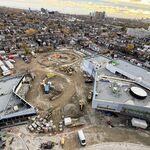Building a winner in midst of failure
Jul 23, 2009 04:30 AM
Christopher Hume
As failures go, this is one of the most successful in the city's history.
Despite the fact the company behind Toronto Life Square has gone into receivership, the project is by all accounts doing just fine, thank you very much.
In case you're wondering, Toronto Life Square shouldn't be confused with Yonge-Dundas Square across the road. The latter really is a square, the former a building.
Constructed on land expropriated by the pre-amalgamation City of Toronto in the late 1990s, the massive entertainment complex was developed by a subsidiary of PenEquity Realty Corp. From the start, however, the project was nothing but trouble for the firm. Work on the building began five years behind schedule, and only after a series of setbacks. At one point, Disney, a prospective tenant, simply walked away from the table, leaving PenEquity in a state of open-mouthed shock.
Of course, Toronto Life Square – the building – isn't much to look at. Big, grey and hopelessly plain, it had almost nothing going for it other than its location, but what a location. Occupying the northeast corner of Yonge and Dundas, one of Toronto's and Canada's busiest and most important intersections, it couldn't help but succeed.
The collapse of PenEquity has more to do with its own ineptitude and the economic meltdown than the viability of the complex itself.
Indeed, when the city took over the land, the idea was to use the public realm as a way to intervene and reverse the decline of the neighbourhood. In the late 1990s, don't forget, Yonge and Dundas has been sucked into a downward spiral of dollar stores and cheap clothing outlets, drugs and crime. Landlords weren't maintaining their buildings and visitors were staying away in droves.
The Eaton Centre didn't help either. Though it is the city's largest tourist attraction, it sucked people off the streets, turning the neighbourhood into an urban wasteland.
But since then things have improved hugely; though Dundas Square has not been universally embraced, there's no question it has improved the look and feel of the area immeasurably, attracting thousands and thousands of people and prompting millions of dollars worth of improvements to surrounding buildings. Even the Eaton Centre rebuilt its main facade and life returned to the streets.
So it's no surprise that real estate professionals say it won't be hard to find a buyer for Toronto Life Square. In fact, the complex has never been more desirable as a piece of real estate.
PenEquity's crisis was triggered three months ago when the Royal Bank called in its $123 million loan. By then, the developer's debt had soared to $280 million.
But as James Robinson, the executive director of the Downtown Yonge Business Improvement Association, points out, "It makes little difference to the public who owns the building."
"The project was conceived as a catalyst for regeneration of the district," he explains, "and that has happened. What we're seeing in the receivership is a result of financing and economic conditions. There's no doubt Toronto Life Square has reinvigorated the street. Even before it was built, it had spurred investment. People forget but in the mid-1990s, the area was in serious decline with drug dealing and petty crime. The building is fully tenanted from a retail perspective, and they all seem to be doing well. In my view, it has done its job."
Those tenants, who include AMC, Future Shop, Adidas and various restaurant chains, may be the usual commercial suspects. But in this case, they will be wanted whether PenEquity is dead or alive.
Christopher Hume can be reached at
chume@thestar.ca
Source
Video




